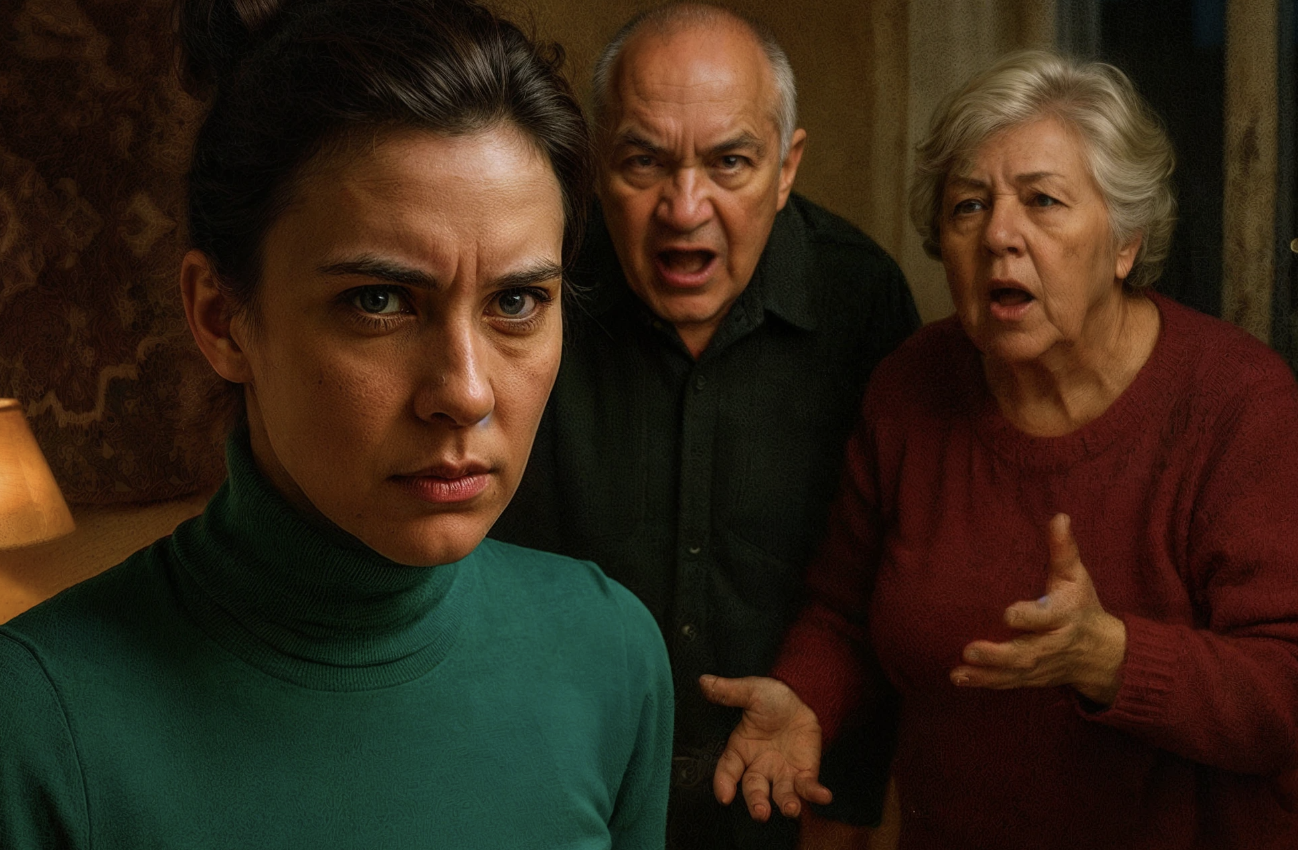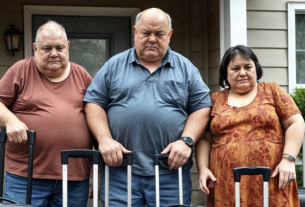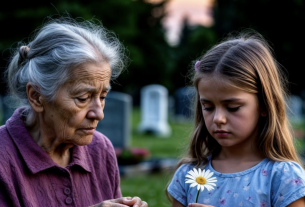Natasha saw the photo in her feed by accident. Vika next to a brand-new foreign car — white, with a red bow on the hood. The caption read: “Thank you, Mom and Dad! Now I can get to the kids faster!”
Her knuckles turned white. Natasha squeezed the phone in her hand.
She dialed her mother.
— Hello?
— What’s that car Vika has?
— Ah, you saw it? Beautiful, isn’t it? We helped her.
— Where did you get the money?
Silence.
— We sold the dacha.
Natasha didn’t understand right away.
— Which dacha?
— Yours. The one you bought for us. We decided — why do we need it? Our backs hurt, we don’t go there anymore. And Vika needs a car with the kids. You understand, don’t you?
Around her was the noise of the hospital corridor, someone’s laughter. Someone called out to her, she didn’t turn around.
— Natasha, why are you quiet? You’re not against it, are you? She’s your sister. We’re your parents, we know better.
Natasha hung up.
Five years ago, she had sold her grandmother’s apartment — the one that had been left to her alone. She added all her savings. Bought her parents a dacha.
Her mother had cried back then. Her father had said, “You’re our golden girl.”
Golden.
That evening Natasha went to see them. Without calling first.
Her mother opened the door.
— Why didn’t you warn us you were coming?
Natasha walked into the room. Her father was in front of the TV — he didn’t even turn around.
— Why didn’t you tell me about the dacha?
Her mother pressed her lips together.
— Why should we? We decided ourselves. It’s our property now.
— Mine. I bought it.
— You gifted it to us — which means it’s ours. We decided Vika needs it more. She has kids, a husband, work far away. And you’re on your own, you’ll manage.
Her father turned around.
— Why are you whining? Being greedy?
Natasha looked at him. At her mother. They really didn’t see a problem.
— You could have asked.
— Asked? — her mother twisted her face. — Vika’s the younger one, it’s harder for her. You always land on your feet. You’re strong.
Natasha stood up. She didn’t say anything. She walked out. Closed the door — quietly, without slamming it.
For two weeks she stayed silent. Went to work, came home, lay down on the couch.
Her son asked her once:
— Mom, why are you so sad?
— I’m tired.
He went to his room. Didn’t push her.
And Natasha kept remembering: how they’d stood on the threshold of that dacha. Her mother crossing herself. Her father hugging her: “Thank you, daughter.” Natasha had felt so right then. Needed. Good.
Now she understood: she had just been convenient.
On Friday evening Vika called.
— Why are you ignoring Mom? She’s beside herself.
— Hi, Vik.
— She says you’re offended because of the dacha. Natasha, seriously? I really do need the car. Kids, daycare, work — you get it. Or are you just being stingy?
Natasha closed her eyes.
— It didn’t occur to any of you to ask me?
— Why? Our parents decided. They know better.
— I bought it with my money.
— So what? You gave it to them. A gift is when you give it and don’t butt in afterward.
Natasha hung up. Got up. Went to the closet. Took out a folder with documents — the gift deed, bank statements, receipts.
She sat down at the table. Opened her laptop.
An hour later she had found what she was looking for.
On Monday Natasha went to her parents again. With the folder.
Her father opened the door, frowned:
— What did you come for this time?
Natasha walked past him. Her mother from the kitchen:
— So, you finally came to your senses?
Natasha put the folder on the table. Opened it. Spread out the papers — slowly, one by one.
— I pulled all the documents for the dacha.
Her mother tensed up.
— The dacha is registered in your names, but the money came from my account. By law, if the recipient of a gift shows gross ingratitude, the transaction can be challenged. I’m gathering documents for court.
Her mother went pale.
— What are you saying?
— Either you return the money to me, or we sort it out publicly. In court. In front of everyone you know.
Her father jerked up:
— Are you out of your mind?! You want to disgrace us?!
— I want to get back what’s mine.
Her mother grabbed her hand:
— Natasha, we’re family!
Natasha pulled her hand away:
— You’re the ones who chose who in this family matters more.
She turned and walked out.
Behind her, her mother screamed something about ingratitude, about how she was killing them.
Natasha didn’t look back.
Three days of silence. Then it started.
Vika kept calling — Natasha didn’t pick up. Vika texted: “Are you insane?! You trying to take the car away?!”
Natasha didn’t answer.
An hour later — a voice message. Natasha put it on speaker. She was chopping vegetables for dinner, listening.
Vika’s voice — hysterical, cracking:
— Natasha, are you even thinking straight?! My husband said if we have to sell the car because of you, he’ll throw me out! I have kids! Do you get that?! You’ve always been selfish! Always only thought about yourself!
The message cut off.
Natasha went on slicing tomatoes. Evenly. Calmly.
The next day — her father called:
— Natasha, enough. Stop this circus.
She was silent.
— Do you hear me? Your mother hasn’t eaten for two days, she’s sobbing her heart out. Do you realize what you’re doing?
— I do.
— Then stop it. We’re not giving anything back. Just forget it already.
— I won’t forget. Give it back or we’re going to court.
— To hell with you! — her father exploded. — Ungrateful! We raised you, fed you, and you drag us to court?!
Natasha hung up.
Her hands were shaking — but not from fear. From anger. From finally not keeping quiet.
Another day later Vika came over. Without calling. Natasha opened the door — her sister stood there, pale, eyes red.
— Can I come in?
Natasha silently stepped aside.
Vika walked in, sat on the edge of the couch. She was quiet for a minute. Then:
— Are you really going to go to court?
— I already filed.
Vika flinched:
— Why?
— Because all of you decided I’d swallow it. That I always swallow everything.
Vika pressed her lips together:
— Natasha, I didn’t know it meant so much to you. Mom and Dad said, “We decided.” I thought you were fine with it.
— No one asked me.
— Well, I’m sorry! I really didn’t mean any harm!
Natasha looked at her. Vika was always like this — first she yelled, then she cried.
— Sell the car. Give the money back.
Vika turned white:
— You’re serious?
— Yes.
— Natasha, my husband will kick me out!
— That’s your problem. You took what wasn’t yours — now return it.
Vika jumped to her feet:
— You’re just taking revenge! You’re jealous that I have a family, kids, and you have no one!
Natasha stood up. Opened the door:
— Leave.
— You’re throwing me out?
— Yes. Leave. Right now.
Vika walked to the door, turned around on the threshold:
— You’ll regret this. Mom was right — you’re selfish.
Natasha closed the door. Leaned her back against it. Exhaled.
A week of silence. Then a message from her mother: “You’ve finished us off. I hope you’re happy now.”
Natasha didn’t answer.
The next day — a bank transfer. From Vika. Comment: “Sold the car. Happy now?”
Natasha wrote back briefly: “Waiting for the rest from our parents.”
Three days later — another transfer. From her father. Less than the full amount, but still a significant sum.
Natasha accepted the money.
She wrote one message in the family chat:
— I got the money. I don’t want anything else from you. Don’t write to me. Don’t call me.
She left the chat. Deleted it. Blocked all three of them.
She sat in the kitchen. Looked out the window — it was getting dark, the streetlights were on outside.
Her phone was silent.
It didn’t hurt. It was just empty.
She got up. Put the kettle on.
Tomorrow — work. The day after — a meeting at her son’s school. Life goes on. Only now — without those who thought she’d endure anything.
Two months passed.
Natasha lived as usual — work, home, her son. Her phone no longer blew up with calls. No one invited her to family dinners, no one asked for help, no one reminded her, “You’re the oldest, you have to.”
Silence. Unfamiliar, but peaceful.
Her son asked once over dinner:
— Mom, doesn’t Grandma call anymore?
— We had a falling-out.
— A big one?
— Yes.
— And you won’t make up?
— No.
He nodded. Didn’t ask more. Smart kid.
A month later, a message came from an unknown number:
“Natasha, it’s Vika. I’m writing from someone else’s phone. You were right. Forgive me.”
Natasha read it. Deleted it. Blocked the number.
Not out of anger. It was just too late.
On Saturday she and her son went to look at apartments. Natasha had decided — with the money returned, plus her own savings, she would buy a bigger two-room place. Her son would soon be seventeen; he needed a proper room of his own.
The third option — a bright kitchen, big windows. Her son walked around the rooms, peeking out the windows:
— Mom, look, there’s a school right next door!
Natasha came over. Looked out. Smiled.
— Do you like it?
— Yeah. Are we taking it?
— We’re taking it.
That evening they were riding home on the bus. Her son was scrolling through his phone, Natasha was looking out the window. The city slid past — evening lights, bustle, people hurrying about their business.
Suddenly her son said:
— Mom, I’m glad you didn’t keep quiet back then.
Natasha turned to him:
— Why?
He shrugged:
— I don’t know. You’re just kind of… different now. Stronger, I guess.
Natasha smiled. Put her arm around his shoulders:
— Thank you.
He nodded. Went back to his phone.
And Natasha looked out the window and thought: yes, she had become different. The kind of woman who isn’t afraid to stand up for what’s hers. The kind no one can use anymore.
And that was the right way to be



